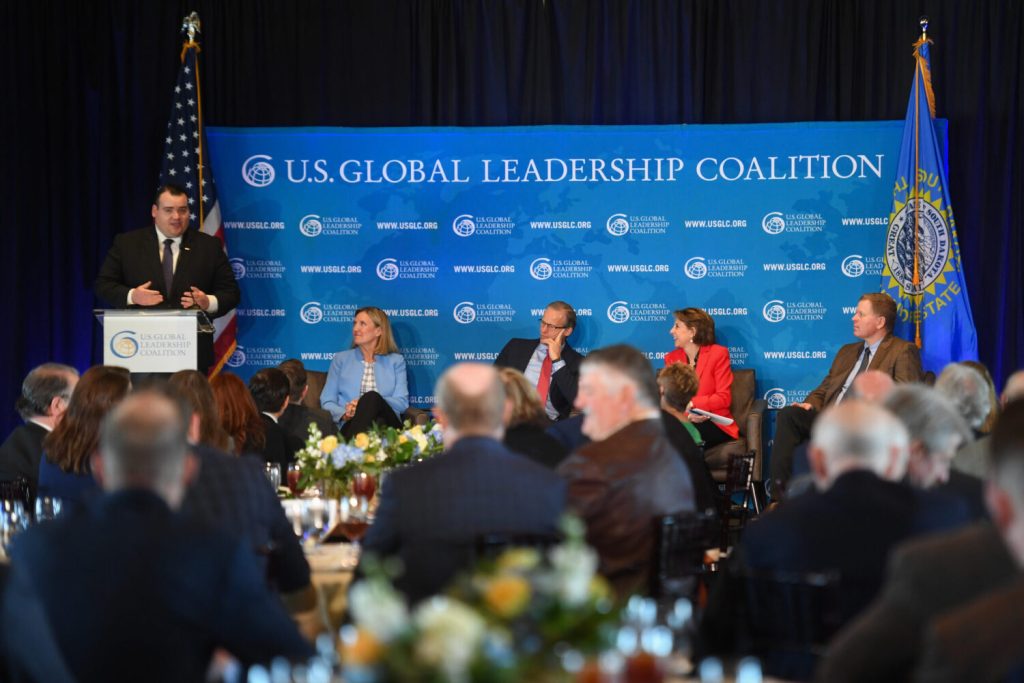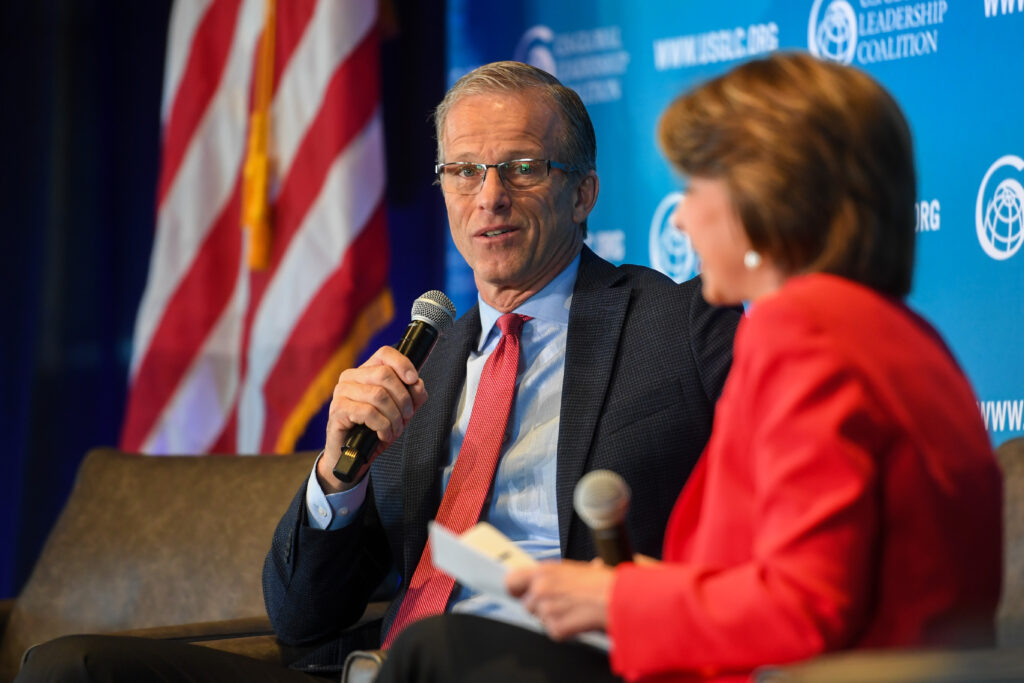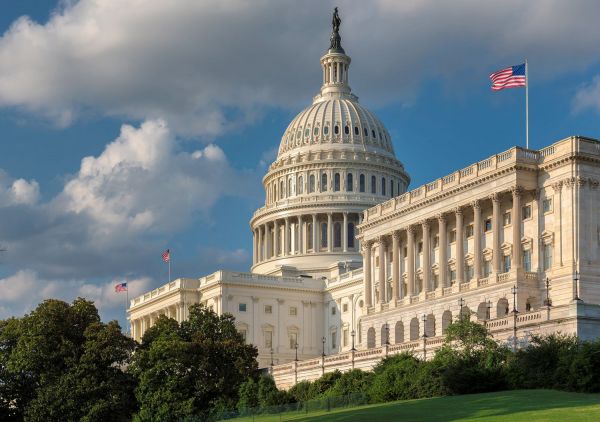SIOUX FALLS, S.D. – U.S. Sen. John Thune spent March criticizing the Biden Administration trade policies and touting the importance of free trade to South Dakota and the nation’s trade economy during a U.S. Global Leadership Coalition held in South Dakota.
In a recent letter, for example, Thune and other senators lambasted the administration for not committing to a new free trade agreement since Biden took office in 2021. The letter argues that lack of action is, in part, causing the national agricultural trade deficit to skyrocket in recent years, he claimed. Thune wants a trade agreement with the United Kingdom.
The U.S. agricultural trade deficit is projected to reach a record $30.5 billion in 2024. South Dakota, as an agricultural state, largely depends on international trade.
But Thune’s interest in free trade and critical eye to the policies around it extend beyond the current administration.
Former President Donald Trump’s administration only approved one trade agreement, reconfiguring the North American Free Trade Agreement (NAFTA) into the U.S.-Mexico-Canada Agreement (USMCA)in early 2020. Trade deficits with Canada and Mexico continue to climb despite the agreement, according to reporting from POLITICO.
 Cattle and Ranch Organizations Want Relief From Biden Administration Over Trump USMCA Trade Deal 〉
Cattle and Ranch Organizations Want Relief From Biden Administration Over Trump USMCA Trade Deal 〉
R-CALF Says Trump USMCA Trade Agreement Failed U.S. Cattle Producers〉
Trump USMCA Trade Policies Cost American Ag Producers Billions of Dollars, Especially In The Midwest〉
Shortly after his inauguration in 2017, Trump withdrew the United States from the Trans-Pacific Partnership, which was a proposed trade agreement between 12 Pacific Rim economies, including Mexico, Canada, Japan, Vietnam and Malaysia.
With both administrations historically pivoting away from an embrace of free trade policies, that leaves an uphill battle for Thune’s agenda no matter who is sworn into the White House next January.
“There is certainly a sentiment in the U.S. right now in certain quarters that America doesn’t need to be engaged in the world. I would disagree with it,” Thune told South Dakota Searchlight.
South Dakota Panel Tells Rep. Johnson To Protect Business Ties With China 〉
Thune’s comments came after a Wednesday panel discussion in Sioux Falls to celebrate the creation of the South Dakota Advisory Committee to the U.S. Global Leadership Coalition, which encourages America to stay involved in international affairs.
About 114,000 jobs in South Dakota – about 20% of jobs in the state – depend on trade. South Dakota exported $6.7 billion globally in 2021, about $5 billion of which was from agricultural products.
That makes international affairs all the more important to land-locked South Dakota, said DaNita Murray, executive director of South Dakota Corn.
“I don’t think one has to be an economist to understand that demand, regardless of where it comes from, is important for the price on the big board of corn. And that certainly has a relationship to what happens in South Dakota,” Murray said.
Corn prices halved from over $8 to more than $4 a bushel in 2022. Meanwhile, operating costs have increased, tightening profit margins for producers.
“I don’t know when we’re going to see $5 for corn again,” Murray added.
Thune is carrying a bill with Delaware Democrat Sen. Chris Coons to launch free trade negotiations with the United Kingdom. Thune called it a “no brainer” after Wednesday’s panel discussion. But he’s still hoping to one day return to the Pacific.
The 11 other countries that were originally part of the Trans-Pacific Partnership formed a new free trade agreement without the United States called the Comprehensive and Progressive Agreement for Trans-Pacific Partnership. The partnership initially launched in 2018, and was intended to open up trade among the same group of partners.
“From a national security standpoint, I just think there are countries in that region of the world, many of whom are in what would have been TPP and are now CPTPP, who are in China’s geographical orbit right now, but are more naturally aligned with the U.S.,” Thune told Searchlight. “I think they would much rather be doing business with America, but because we’re not there they end up just gravitationally getting sucked into China’s orbit.”
In regards to the current US-Mexico-Canada Agreement promoted and signed by former President Donald Trump in 2017, the U.S. trade deficit has gone from $85 billion in 2017 to $220 billion in 2023. Thune blames Mexico for not honoring the agreement in addition to China’s practice of trans-shipping, which is shipping through other countries to avoid tariffs.

That has an impact on the national trade deficit. The strength of the U.S. dollar, he added, is also making it more expensive for international markets to buy U.S. goods.
Andrea Thompson, the CEO of Dakota State University Applied Research, (DARC) warned attendees of the Sioux Falls luncheon that China is already heavily involved in emerging markets in countries across the African continent.
“You’ve got to stay present, you’ve got to stay forward both economically, diplomatically and militarily,” Thompson said.
Murray, with South Dakota Corn, said she’d like to look beyond the United Kingdom and other established countries and see partnerships in emerging markets.
“Those are incredibly important for demand growth,” Murray said, because agreements with African or East Asian nations can influence an emerging economy’s stance on imports, bio-technology and other trade-related policies.
“It’s not just about demand and import tariffs and giving U.S. grain a competitive advantage or keeping the playing field, but also about very obscure topics at times that impact the ability for that grain to flow freely,” Murray said.
That will require continuing conversations about free trade with policy makers. Thune hopes for a receptive White House administration, regardless of which party is in charge.
“If you’re running trade deficits, if you’re not selling abroad, you’re not creating that demand,” Thune said. “… I think we have the most efficient producers and I think we can win in the global marketplace, but we’ve got to have access to it.”












